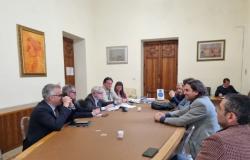«We live in a world where the male mentality is oppressive towards women, in a crazy world we find ourselves fighting for women’s rights. We live in a sort of Middle Ages where man thinks he can possess their bodies and take away their freedom. Instead, it is freedom that we want! Fatoumata Diawara’s concerts are never simple musical sets, but also become testimonies of social dramas, stances against racial segregation, indignation towards the miseries of all wars. Among the red velvets of the Regio – largely sold out for several days as part of the Turin Jazz Festival, the performance of the African singer, actress and musician not surprisingly fell on Liberation Day, preceded by partisan readings on the voice of Sara D’Amario and a touching testimony by Adriana Cantore – a thirteen-month-old child in 1944 taken with her mother to the “Le Nuove” prison by order of the Nazis. Adriana’s mother knew who had killed two German officers near Susa, forty kilometers from Turin, but she did not reveal their names to the SS who occupied the infamous First Wing of the prison.
ON STAGE Fatoumata, electric guitar slung over her shoulder, a proven quartet accompanying her composed of Juan Finger (bass), Jurandir Santana (electric guitar), Fernando Tejero (keyboards), Willy Ombe (drums), illuminated by four headlights and with a screen behind her shows several of his videos, offers his original style that seamlessly mixes Afro beat with world music, pop and funk – with many excerpts from his third work London knockout, produced by Damon Albarn. Pulsating bass and seventies synths where the Malian artist’s hoarse voice becomes penetrating and at times persuasive. She calls the audience, cajoles them, dances frenetically – at nineteen she joined the French street theater company Royale de Luxe with which she toured the world before starting to sing in Parisian clubs and cafés. She intrigues her music outside the box, even when it may seem excessive or at times redundant, where polyrhythms chase each other. Africa – but not only – is at the center of her story when she talks about infibulation in the song Boloko (from the debut album Fatou), «Over 200 million women in the world – she says – suffer this devastating practice. I knew that someone had to start talking about it to try to change the mentality of thousands of people.”Standard and unreleased for Gonzalo Rubalcaba, the cascades of notes by Marta Warelis
FIFTEEN Grammy award nominations, thirty albums behind him, endless collaborations, Gonzalo Rubalcaba’s career began in the late eighties thanks to mentors such as Dizzy Gillespie and Charlie Haden. The Cuban musician is among the most popular pianists in the jazz scene and he also demonstrated it in the live set in Turin in a trio with two historic collaborators, bassist Matt Brewer and Cuban drummer Ernesto Simpson. Rhythmic sense and phrasing, in a fusion of standards (A night in Tunisia), traditional and original songs in a game of references and innovative solutions where the moments in which Simpson builds splendid interplays with Gonzalo also stand out.
A complex sound world is also that of the young Polish pianist Marta Warelis – with studies in Amsterdam – on stage at the Vittoria theater for a solo performance made up of delicate balances in the field of improvisation. An album under his belt (A Grain of Earth of 2022), was recently involved by Dave Douglas in his project Secular Pswalms. A performance absorbed between glimpses of silence and moments of extreme enthusiasm that culminate in sound progressions and cascades of notes, indebted in this to the teachings of masters such as Cecil Taylor.





